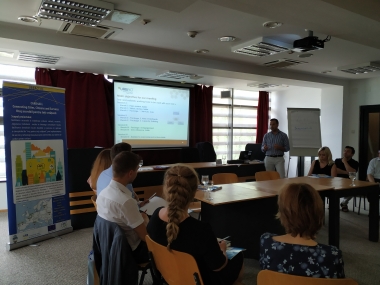OUR SECOND TRANSNATIONAL MEETING IN SUCEAVA
Edited on
09 August 2019Last June, on the 19th and 20th, our Transfer Network CARD4ALL met in Suceava to hold our second transnational meeting.

Once we know each other better and our transfer plans are launched, this meeting was very important to define the next steps inside our transfer journey.
After a couple of weather problems that caused some delays with the flights, we arrived all save to Suceava ready to continue working on our project.
The first contact was a warm welcome by Suceava's team, the members of the Urbact Local Group and the Deputy Mayor that confirmed the commitment and engagement of Suceava with our project CARD4ALL.
We started the morning session with a Human Bingo that helped us to discover interesting facts about our colleagues and then, we continued with the main objective of the first day meeting: to review and rethink the transfer plans as well as test and validate working tools to be used with the Urbact Local Groups.
Taking into account that the things change depending on the eye of the beholder, our Lead Expert organized a peer-review session where each city checked the completeness, coherence, concerns and continuation of the transfer plan of other city that was enhanced with a review of the vision working in pairs. The next step was to dissect the good practice and to focus on those services and equipments that are really of the interest of each city. To do this, Gijón detailed the resources needed for each component: hard investments and capacity building of the human resources.
After lunch, it was a good moment to get inspired by a very interesting presentation made by Adrian-Ioan PETRARIU from the Faculty of Electrical Engineering and Computer Science of Ștefan cel Mare University of Suceava about the RFDI technologies and their possibilities within the citizen cards universe.
The afternoon was dedicated to reflect about the work with the URBACT Local Groups and to draft a stakeholders map identifying importance and influence of each member and we finished the first day discussing the potential barriers that may arise and how to overcome them and the next steps that we are going to undertake.
During the second day, we combined visits to potential services that Suceava may include in their citizen card such us electrical bikes and cars with project management related topics. Besides this, we saved some time to go through communication principles and task as well as we practiced how to capture and share learning using vox-pops, diary entries and reporting. And last but not least, our colleagues from Suceava also prepared some visits that helped us to understand better the culture and history from Suceava and the Bucovina region. Intercultural exchanges are also very worthy during transnational meetings.
Submitted by l.gmendez on
